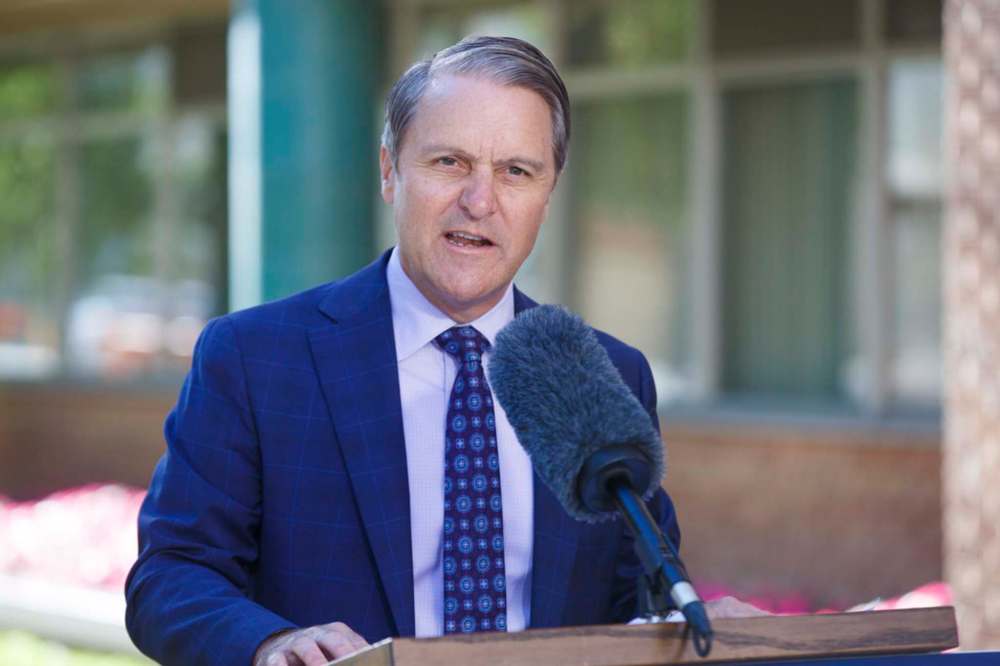Minister mulls ways to address opioid crisis
Advertisement
Read this article for free:
or
Already have an account? Log in here »
To continue reading, please subscribe:
Monthly Digital Subscription
$0 for the first 4 weeks*
- Enjoy unlimited reading on winnipegfreepress.com
- Read the E-Edition, our digital replica newspaper
- Access News Break, our award-winning app
- Play interactive puzzles
*No charge for 4 weeks then price increases to the regular rate of $19.00 plus GST every four weeks. Offer available to new and qualified returning subscribers only. Cancel any time.
Monthly Digital Subscription
$4.75/week*
- Enjoy unlimited reading on winnipegfreepress.com
- Read the E-Edition, our digital replica newspaper
- Access News Break, our award-winning app
- Play interactive puzzles
*Billed as $19 plus GST every four weeks. Cancel any time.
To continue reading, please subscribe:
Add Free Press access to your Brandon Sun subscription for only an additional
$1 for the first 4 weeks*
*Your next subscription payment will increase by $1.00 and you will be charged $16.99 plus GST for four weeks. After four weeks, your payment will increase to $23.99 plus GST every four weeks.
Read unlimited articles for free today:
or
Already have an account? Log in here »
Hey there, time traveller!
This article was published 03/09/2020 (1944 days ago), so information in it may no longer be current.
A record number of opioid drug overdoses in Winnipeg so far this year has prompted the provincial government to look for other ways to respond to the crisis, Manitoba’s health minister acknowledged this week.
In June, the province said it would invest as much as $200,000 to double the access to naloxone kits. The life-saving antidote medication reverses the effects of an overdose. First responders have had to dole out much higher doses of the antidote to counter much more toxic street drugs such as fentanyl and heroin, and as community organizations tasked with distributing take-home naloxone kits reported higher demand.
The Winnipeg Fire Paramedic Service administered more naloxone in the first eight months of this year than it did in any of the past four years, according to WFPS data provided to the Free Press. It shows more than 1,550 naloxone doses were given to 909 people as of early August.

For the first time since the pandemic was declared, Health Minister Cameron Friesen spoke publicly about the spike in overdoses when asked how the province is responding to them. “We’re always concerned. We know that it’s a pandemic and we know that the pandemic does not make it easy on people; it doesn’t make it easy on people who also suffer from addictions, and so we’re aware and concerned about what we’re seeing as the increase of overdose in Manitoba, and so we’re taking action,” Friesen said. He was speaking to reporters following a news conference at Health Sciences Centre Wednesday, during which the government promised to hire more nurses and security guards and devote more mental-health beds for patients with addictions.
“Just recently, we expanded the ability for Manitobans to have access to these take-home naloxone kits,” Friesen added. “We are thinking about other ways that we can respond. We are taking advice from our experts in the field, and of course on a daily basis, many people on the front line are involved in the continual delivery of services to Manitobans who need them.”
The Free Press had earlier requested an interview with Friesen about the province’s plan to respond to opioid overdoses, including whether the province is considering supervised consumption sites, and was told he wasn’t available.
In an August interview with the Free Press, WFPS public education co-ordinator Cory Guest said crews have seen opioid use, including fentanyl, increase dramatically since this spring.
“The lethality of the drugs that we’re seeing is something that we’ve never seen before. And I’m comfortable saying that’s not only in Winnipeg, that’s globally, for sure. So what does that mean for us? It’s challenging in some of our treatment protocols because, (given) the lethality of these drugs, we’re having to increase the antidote that we’re giving to lots of these patients,” Guest said.
Advocates have called for better data to inform provincial policies on addictions response. The number of opioid deaths in Manitoba so far this year is unknown; a representative for the medical examiner’s office told the Free Press those statistics aren’t expected to be available until the end of the year.
Data compiled by the federal government from provincial coroners and chief medical examiners show 287 Manitobans died of opioid-related causes from 2016 to 2018. Twenty-six people died from January to September 2019.
katie.may@freepress.mb.ca
Twitter: @thatkatiemay

Katie May is a multimedia producer for the Free Press.
Our newsroom depends on a growing audience of readers to power our journalism. If you are not a paid reader, please consider becoming a subscriber.
Our newsroom depends on its audience of readers to power our journalism. Thank you for your support.

